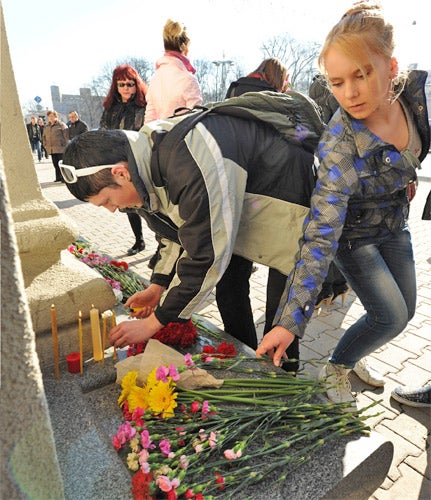Belarusian KGB weighs possible motives for fatal metro bombing

Authorities in Belarus released details yesterday about the main suspect in the bombing of Minsk's metro system, which killed 12 people on Monday. But the motive behind the attack in the capital remained unclear.
Police and security forces stepped up the hunt for those responsible, detaining several people for questioning – although they did not confirm who the suspects were or what reasons they might have had for the bombing.
"Information is being worked on from several people," said Andrei Shved, the deputy prosecutor general, who is leading the investigation. "People have been detained."
The main suspect was described as a heavily built 27-year-old man of medium height, who was still at large.
The bombing has taken most observers of the region by surprise. Belarus is a carefully controlled dictatorship, but unlike Russia it has no Islamist insurgency and the political opposition to the authoritarian President Alexander Lukashenko has no history of violence.
The explosive device was packed with ball bearings and nails, and ripped through Oktyabrskaya station in central Minsk, located a stone's throw from Mr Lukashenko's offices. It was believed to have been detonated remotely, rather than by a suicide bomber. Over 200 people remained in hospital yesterday, with 26 of them in a serious condition, according to authorities.
The head of the Belarusian security service, still known by its Soviet-era KGB initials, said yesterday that they were investigating three main versions of the attack: that it had been carried out by people working for a foreign power; by young extremists; or by someone mentally ill. Mr Lukashenko has also said that the bombing may have been a "present" from enemies outside the country.
The Belarusian leader, who has ruled the country since 1994, won the most recent set of presidential elections, held in December last year. But Western countries said the vote was neither free nor fair. In demonstrations after the vote, hundreds of activists and most of the opposition presidential candidates were detained. The EU imposed a travel ban on Mr Lukashenko and his entourage after the election result.
Opposition politicians in the country said yesterday that the authorities could use the blast as a pretext for further political repression. Mr Lukashenko has said in the past that he will bring the army into the streets if necessary.
KGB agents yesterday searched the offices of one of the country's few independent newspapers, Nasha Niva, blockading the editorial staff inside in an early sign that the regime may try to pin the blame for the blast on opposition forces.
"The authorities may use the explosion for further limitations of civil freedoms and tightening security measures," Anatoly Lebedko, leader of the opposition United Civil Party, told the Associated Press.
Subscribe to Independent Premium to bookmark this article
Want to bookmark your favourite articles and stories to read or reference later? Start your Independent Premium subscription today.

Join our commenting forum
Join thought-provoking conversations, follow other Independent readers and see their replies